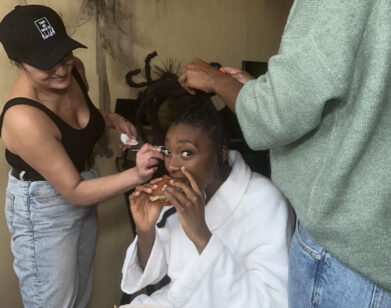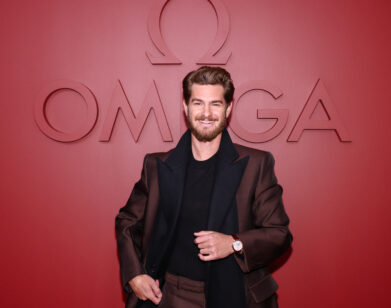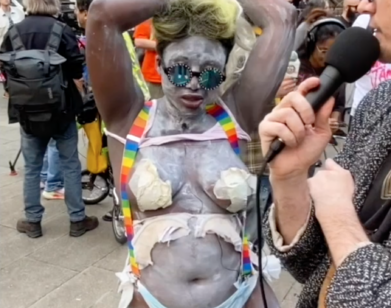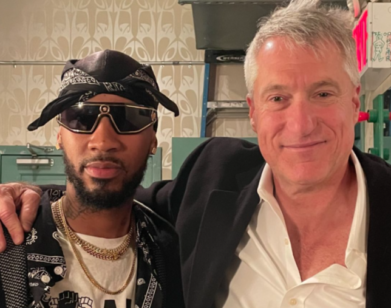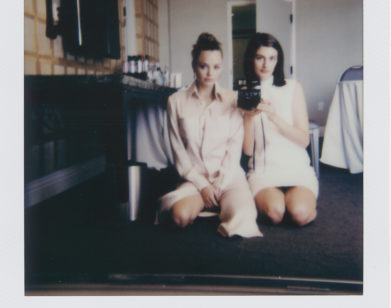In Conversation
Christopher Walken and Stephen Merchant Relive Their British Adventure
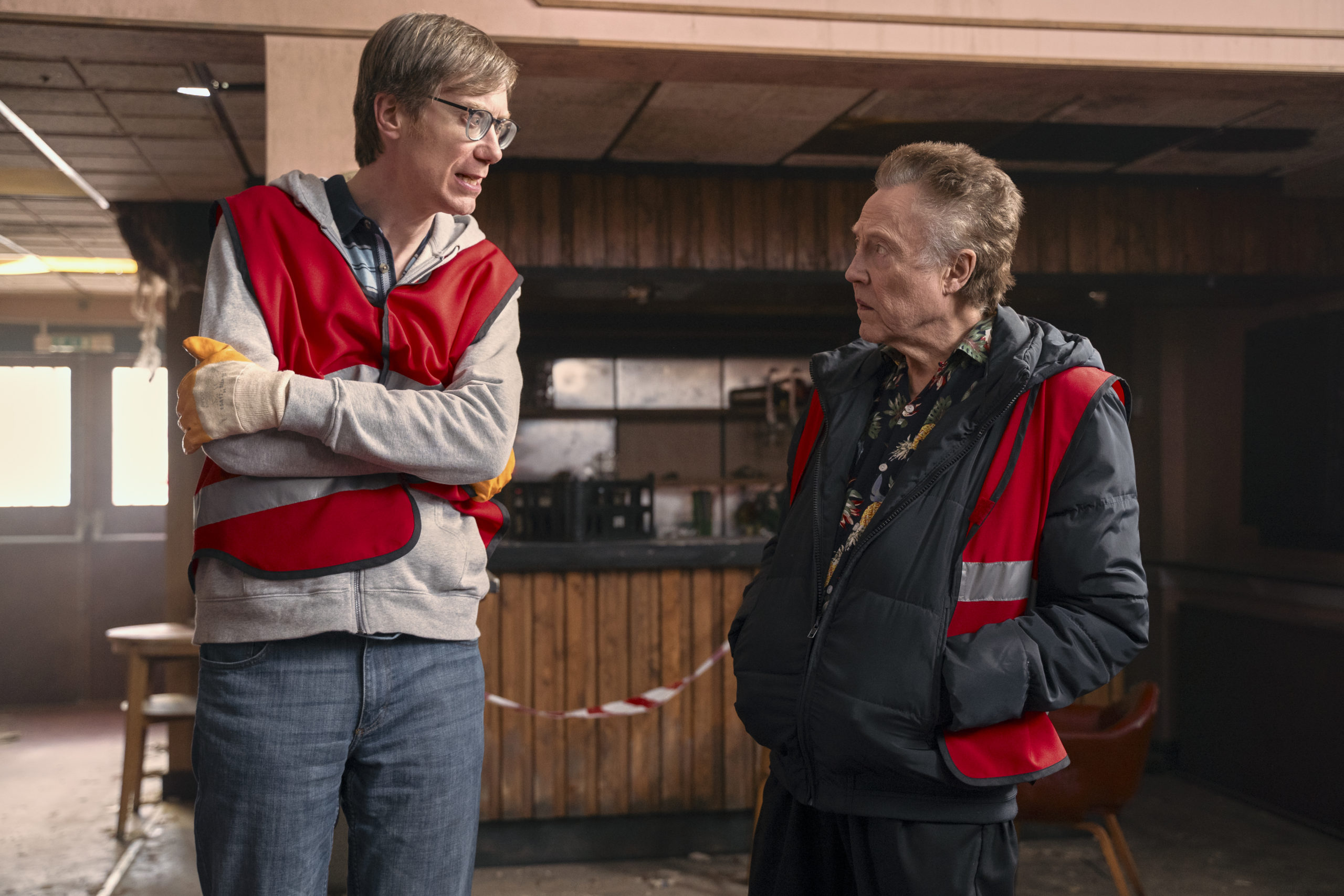
Since Christopher Walken famously doesn’t own a computer, when Stephen Merchant wanted him to appear in his new television show The Outlaws, he had to fax him the script. Walken, who is 79 and still works regularly (he can also currently be seen on the Apple series Severance), must have liked what he read, because he invited Merchant to his home in Connecticut to talk more about the BBC One and Amazon co-production. Before he knew it, Walken was in Bristol, England, as part of an ensemble cast playing a group of people in community service who stumble on a big bag of money. For Merchant, who co-created The Office and Extras alongside Ricky Gervais, landing Walken to play the career criminal Frank Sheldon was a coup. Not only was he casting one of the most legendary performers alive, but, as it turns out, he was making a friend, too.
———
STEPHEN MERCHANT: Hey Chris, it’s Stephen here.
CHRISTOPHER WALKEN: Hey Stephen. How are you?
MERCHANT: I’m very well.
WALKEN: Congratulations on the show. You did a great job.
MERCHANT: Oh, thank you, sir. Given we’re here to talk about the show, Chris, I wondered if you’d just help the readers understand a little bit about your character, Frank? Maybe tell us a little bit about your interpretation of him.
WALKEN: Frank came to England 40 years earlier. What’s interesting is that, in those 40 years, he seems completely unassimilated. He seems to have gotten frozen in time. So he’s an American in England, and he has a family and he’s with all these terrific actors.
MERCHANT: I remember I came to your house and we talked about the character, and you asked me a great deal of questions. I was interested to know, what is it you’re trying to find out when you speak to a writer or director before you accept a job?
WALKEN: It’s hard to say. It’s feeling out whether you’re going to be comfortable. I certainly did feel that way with you. I was very comfortable, with the help of all those really terrific actors. I came away being very fond of everybody. And I remember that first day where everybody was quiet, but we warmed up to each other very quickly.
MERCHANT: Sometimes when there are actors who are as experienced as you, there’s the feeling that you’ll come in and do one take and say, “That’s it. I’m going back to the hotel.” But you seemed very keen to do different takes, to try different things. Is that right?
WALKEN: Yeah, absolutely. I’ve always felt that one of the unsung heroes of moviemaking are the editors. I try to offer the editors as much variety as I can so that they can shape performances into something unexpected. I’ve always felt that way. I thank you for allowing me to do that, because sometimes directors and producers just want to get on with it.
MERCHANT: Yeah, right. They’re more concerned with visuals.
WALKEN: Yeah. We did it until everybody was happy, which suits me very well.
MERCHANT: I’m interested as well in the physicality that you bring, because I’m thinking about some of my favorite performances you’ve given, whether it’s At Close Range or The Dead Zone. In those two movies your physicality is very different. You’re kind of panther-like in At Close Range. You have a sort of swagger, you’re the patriarch, and obviously in The Dead Zone, you’re weakened, you’re using a cane. Is physicality something that you consider? I’m just thinking about the fact that you began as a dancer.
WALKEN: I don’t think about it much, although I must in some sense. When I watched The Outlaws, I saw an old guy. The way I walked. I wondered if I really walk that way, or whether it was Frank. I guess I’ll never know.
MERCHANT: I think what works for me is the fact that with Frank, you bring a swagger, a confidence, particularly in the way he thinks and speaks. He’s a con man. And yet there’s also a sort of vulnerability to him. There’s a weakness at the core of him. He’s let people down all his life. That’s what seems so effective to me in your performance.
WALKEN: Well, he’s an old con man.
MERCHANT: That’s right. When you’re thinking about doing a project, what is it that makes you say yes? Is there anything in particular you’re looking for?
WALKEN: In the case of The Outlaws, it had a lot to do with you. I was aware of you and your career. I don’t know if we ever talked about this, but just before we met, I had seen you in an interview. I thought that you were fascinating. And then a few days later I got asked to meet with you, and I thought that was kind of serendipitous.
MERCHANT: That’s amazing.
WALKEN: And then, of course, there were the scripts that you gave me, and the prospect of working with those terrific actors. I’ve always liked England. I hadn’t been to Bristol, but I liked it very much. University towns attract me. I never went to college, but I performed in a lot of repertory theaters in America. Bristol very much has that kind of atmosphere.
MERCHANT: Selfishly, I was very keen for you to come and sort of get a feel for the city, and maybe even show you around, as Bristol is my hometown. But of course we were filming during lockdown. Did you have a chance to get a sense of the city?
WALKEN: Oh, yes. Any free time that I had. I spent a lot of time walking around Bristol, particularly down around the harbor. I really got a very good feel for the place and liked it a lot.
MERCHANT: I feel like I have to apologize, though, because you had riots outside your hotel at least twice. You remember?
WALKEN: Yeah. But that had to do with soccer.
MERCHANT: Well I think one of them was soccer. Another was a genuine kind of protest against some kind of government policy or bill.
WALKEN: Yes. There was a protest. I don’t remember what the protest was, but that’s alright. I had a very good time.
MERCHANT: Do you remember some of the TV you watched? You told me one day you had seen a dating show involving naked people?
WALKEN: Oh yes. A very strange show. Really incredible show. I’d never seen anything like that. It was a kind of dating show and people would get naked. I mean, absolutely naked. I was really surprised to see that. But we can’t forget to mention our trip to Stonehenge.
MERCHANT: Oh, absolutely. What a day that was.
WALKEN: What a treat that we got that kind of special trip. Everybody was gone and we were able to go inside. I’ll never forget those little rabbits living in there that were so fearless.
MERCHANT: Yeah.
WALKEN: They must have known that they were Stonehenge rabbits and that nobody would bother them.
MERCHANT: I felt like you knew about Stonehenge. Was it something you were intrigued by beforehand?
WALKEN: The healing stones. Since I was a child, I had been fascinated by Stonehenge, and I’d read quite a lot about it, and what they know about the people who built it. I walked slowly through that portal that looked like some sort of entrance. I had an experience. It was very moving.
MERCHANT: What do you think you were connecting with there? Do you think it was just the history of the place or anything kind of spiritual?
WALKEN: Yes. The place has power. I don’t know whether you’d call it spiritual, history, or imagination, but the place absolutely has power. There’s no doubt about it.
MERCHANT: I agree. There’s something about it that takes us back, makes us connect with just how long we’ve been on this earth. It’s very rare to feel that. To feel that sense of ancestors that stretch back that far. Thousands of years.
WALKEN: Yes. It’s beautiful in a very unusual way.
MERCHANT: Another thing we should mention about Bristol, which some people won’t know, is our experience with Bansky.
WALKEN: I think what I’ve read about it misrepresents what happened. I’m guessing it was completely agreed upon with Bansky himself.
MERCHANT: Absolutely.
WALKEN: But that’s not the way it’s been portrayed. It was portrayed almost as a kind of vandalism, whereas what happened was part of the show, and it’s kind of his modus operandi, to make something and then obliterate it?
MERCHANT: We should make it clear for the reader. Bansky’s from Bristol, and we had never met him. I don’t know if you know him. I certainly don’t. But he agreed to do some graffiti for the show within the show. He wanted Chris to paint over it. And that’s what we did. I think there was some reporting we wrecked a Bansky. But obviously, as you say, it was all agreed upon.
WALKEN: Yes, that we had done that without his approval.
MERCHANT: Do you remember when I told you about that? It was quite an odd last minute request.
WALKEN: It was all very top secret. We knew that he was going to show up after we all went home and it would be there in the morning, and then we would paint over it.
MERCHANT: That’s right.
WALKEN: Well, didn’t he do a painting that was shredded immediately after it was sold?
MERCHANT: He did. I think that was one of the reasons we thought he might like this idea, was that he tried to say, there’s something about the fact that it only exists in the show now.
WALKEN: It only exists for a moment.
MERCHANT: Do you remember when a man tracked us down and showed up on set, and he bought you a bottle of Jim Beam with no evidence that you liked it? I guess he thought you’re American, maybe this is something you’ll like.
WALKEN: Exactly. I gave it to my driver.
MERCHANT: Oh, that’s sweet of you.
WALKEN: My driver said he used it for cooking.
MERCHANT: Do you ever find those experiences odd? When people recognize you? Is that a common thing for you?
WALKEN: If you’re an actor, especially if you’re my age and people don’t occasionally recognize you, it’s not good. I’m always grateful to be recognized. I’m very happy about it when it happens.
MERCHANT: The strangest place I was ever recognized was in Dubrovnik. I ate some bad oysters, and I had the worst stomach pains I’ve ever had. It was agonizing. A Croatian doctor came to the hotel room and said, “Listen, I’m going to give you a muscle relaxant in your butt. Drop your drawers.” I bent over and he pulled out a huge needle. Just as the needle was coming towards my butt, he said, “Hey, are you Stephen Merchant?” I go, “Yeah.” And he said, “Do you mind if we get a picture?”
WALKEN: Absolutely.
MERCHANT: So he took a photograph in the room. It’s amazing where people decide they’re going to recognize you.
WALKEN: Well that’s good news.
MERCHANT: Can we talk a little bit about your earlier career? Is it right that the acting wasn’t something that was particularly interesting to you?
WALKEN: Yes, I was born after the Second World War, which was when television was born. There were a lot of kids who worked in early television because it was so family-oriented. They used kids more as set dressing than as actors. If you could sing a little, dance a little, and maybe say a line. I have two brothers, and my mother put the three of us into that world, which made for a different and very interesting education. But kids don’t say, “Mom, dad, I’d like to be in show business.” I definitely got put into show business. By the time I got out of high school, it was the only thing I knew anything about. So I stayed there. But most of the kids I knew at the time did different things. But maybe I was just lazy.
MERCHANT: Is it something you fell in love with, or did you just feel, well, I’m here now and this is as good a job as any?
WALKEN: At first it was the only sensible thing for me to do. But as time went by, yes, of course. I was in musical theater until my mid-20s, and then I got a job as an actor. My career has a lot to do with luck and happenstance.
MERCHANT: I think you and I share an anxiety, which is about learning lines. For years I resisted doing a play because the idea of learning all the lines seemed so daunting to me. I didn’t know how any actor could ever keep that many words in their head. I feel like we have a similar concern there.
WALKEN: Yes. It’s always been very difficult for me. It’s just as difficult now as it was when I started. It takes me a very long time to learn lines. I know actors who can do it so quickly, but for me it’s pounding lines. That’s what I do. I stand in my kitchen and I just repeat the lines over and over. It takes me months. And that’s why it’s so difficult for me to have somebody say, “Look, here’s a new scene. We’re going to shoot this two days from now,” because it takes me such a long time to learn my lines.
MERCHANT: You always were perfect.
WALKEN: I can only do it if I know the lines so well that I stop thinking about them. If I’m thinking about what I’m talking about it doesn’t work. I’m only free after I know them so well that I don’t even have to think about it anymore.
MERCHANT: You’ve worked with so many amazing directors, whether it’s Sidney Lumet, Spielberg, obviously Paul Schrader, David Cronenberg. Is there anything in particular that you think good directors have in common? Do you think they’re all unique or is there a common factor, at least in the best experiences you’ve had?
WALKEN: Well, of course they’re all unique, and they have their own way of doing things. But I would say that if there’s something in common with all the good ones, it’s that they know how to cast. They cast the right actor in the right part and then they set them free. They’ve cast a certain actor for a certain reason, and the reason is that they’re perfect for the part, and then they just let them go. Sort of like letting children play. I always thought about actors like kids in a sandbox. Occasionally one of them falls out of the sandbox and the director picks them up and puts them back inside. There is that element of play that never goes away no matter how old you get, that happy sets are sets where people are having fun, and where they respect and care about each other. In my experience, that’s when the best work gets done.
MERCHANT: Well, it was a great honor for me to play with you.
WALKEN: You create that atmosphere. You make those things possible. And I thank you for it.

